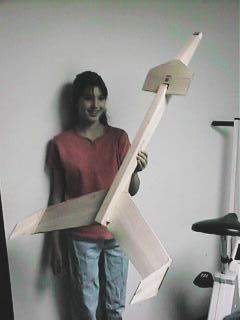| Construction Rating: | starstarstarstarstar_border |
| Flight Rating: | starstarstarstarstar |
| Overall Rating: | starstarstarstarstar_border |
| Manufacturer: | Edmonds Aerospace |
![[Rocket Pic]](images2/rp_edm_ecee_thunder.jpg) Brief
Brief
A BIG rocket glider kit that is easy to put together, looks and flies great.
Construction
The instructions are both sides of a single 11x17 sheet of paper. They may be just a little sparse for a complete beginner, but are adequate for anyone who has built a couple of rockets. They do not include any instructions on balancing and trimming for glide, which would be helpful to those without glider experience. I needed only to make a minor adjustment to add "positive motor retention" points for holding in my 24mm reload casing. Other than that they are complete and accurate.
The laser cut balsa parts fit like a good jigsaw puzzle. I was able to complete construction in one evening, which is amazing considering the size and sophistication of the model.
My finished model was balanced almost perfectly without any trimming when built according to the instructions. Very easy - time to fly it!
Finishing
This kit looks good as is, and I chose not to paint to keep weight down and get longer glide times.
Construction Rating: 4
 Flight
Flight
The Ecee Thunder requires a 3/16" launch rod.
The instructions say to tape the motor in, which is adequate for D12s, but I added a more positive retention for the 24mm reload casing. The added weight is minimal, and I think it would be a nice addition to the kit to include some more secure motor retention system as standard. Preparation is simple: Slide the piston back, secure the motor and fly.
The Ecee Thunder needed no extra trimming for glide - it was ready to go as built. It is large enough that it was was still in pretty good trim after adding a couple of blind nuts and wiring in a 24mm reload casing. To fly with the F12 reload does require some reinforcement - pay special attention to the wingtips and be sure of all glue joints. Boost is nice and straight, and glide is impressive looking, if not of "competition" duration (but then, how many big competition RGs have you seen?).
Flight Rating: 5
Summary
The Ecee Thunder (like the Deltie Thunder before it) is a show stopper and will get attention even at high power launches. Easy to build. Fun to fly. Recommended!
Pros: ease of construction and flight, great looking, easy to trim
Cons: could use some sort of motor retention, kits hard to find
Overall Rating: 4
 |
 |
Flights
 |
 |
R.G. (March 4, 2002)
T.M. (October 14, 2005)
Sponsored Ads
 |
 |












D.U. (August 1, 2000)